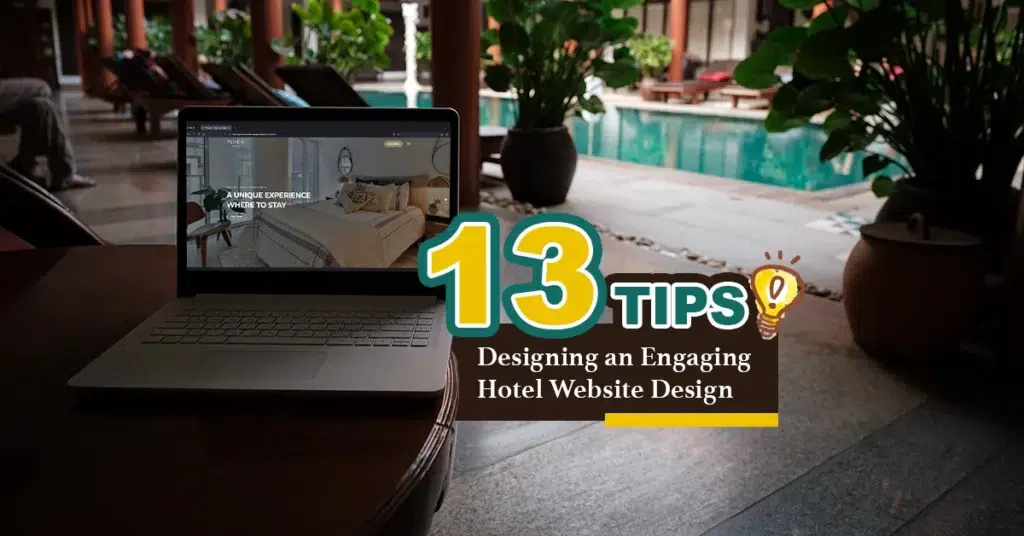
A captivating hotel website design holds immense importance. Creating a positive first impression with a well-designed and professional website can significantly influence potential guests. A well-crafted site can transform casual visitors into loyal guests. User experience plays a pivotal role in achieving this transformation. Utilizing the best hotel website builder can help create functional, user-friendly, and SEO-optimized websites. Every click should lead to delight. Conversion rates soar when the design aligns with user expectations.
A seamless hotel website design ensures guests find information effortlessly. High-quality visuals and intuitive navigation enhance engagement. Mobile optimization guarantees accessibility on any device. An engaging hotel website design can elevate a hotel’s online presence. This leads to increased bookings and satisfied customers.
Introduction to Hotel Website Design
A well-designed hotel website is crucial for attracting potential guests and driving direct bookings. In today’s digital age, a hotel website should be user-friendly, visually appealing, and optimized for search engines to improve the hotel’s online visibility. Utilizing the best hotel website builder can help create a professional hotel website that reflects the hotel’s unique brand identity.
A simple hotel website template can be customized to include high-quality images, detailed descriptions of rooms and amenities, and a seamless online booking process. For boutique hotels, the website design should prioritize responsive design, ensuring that the website is easily accessible on all devices, including desktops, tablets, and mobile phones.
A good hotel website design should also include essential features such as a booking engine, payment solutions, and integration with social media accounts. Optimizing the hotel website for search engines, including Google Hotel Ads, can significantly increase the hotel’s online visibility and drive more direct bookings. A professional hotel website can help independent hotels compete with larger chains and drive more bookings through commission-free direct reservations.
Understanding Your Audience
Identifying Target Demographics
Successful hotel websites are built on understanding visitor behavior and tailoring content to audience needs. By analyzing data, such as heatmaps and session recordings, hotels can identify user interaction patterns and areas for improvement, leading to enhanced user experiences and better search engine results. Content should resonate with the target audience, with families seeking kid-friendly amenities and business travelers prioritizing conference facilities.
Highlighting relevant features and offering personalized content boosts engagement, making guests feel valued and understood, ultimately resulting in higher conversion rates. Additionally, understanding visitor behavior can significantly improve the hotel’s online visibility through built-in SEO optimization features.
Creating User Personas
User personas are fictional characters representing different guest segments, crucial for crafting targeted marketing strategies in hotel website design. They provide clarity on ideal guests, aligning design decisions with user expectations and enhancing personalized experiences. Creating user personas involves gathering data from surveys and interviews, analyzing demographics and behavior, and identifying common traits.
Detailed profiles, including names, ages, preferences, and goals, guide website design and content creation, helping hotels attract and retain customers effectively. Additionally, having a customized domain that reflects the hotel’s brand and appeals to different guest segments can significantly enhance online presence and marketing efforts.
Choosing the Right Hotel Website Builder
When choosing a hotel website builder, it’s essential to consider factors such as ease of use, customization options, and integration with existing property management systems. The best hotel website builder should offer a range of ready-made templates, high-resolution images, and a user-friendly interface to create a stunning website.
A website builder with a content management system (CMS) can help hotels easily update their website and manage online bookings. Additionally, the website builder should offer integration with payment gateways, allowing guests to securely book and pay for their stay online. Technical support, including web developer and web designer assistance, is crucial to ensure a smooth website creation process.
The website builder should also offer tools for search engine optimization (SEO) to improve the hotel’s online visibility and drive more direct bookings. A hotel website builder with a booking engine integration can help hotels drive more direct bookings and reduce reliance on online travel agencies (OTAs). Finally, the website builder should offer analytics and reporting tools to help hotels track visitor behavior and optimize their website for better performance.
Crafting a Compelling Homepage Website Design
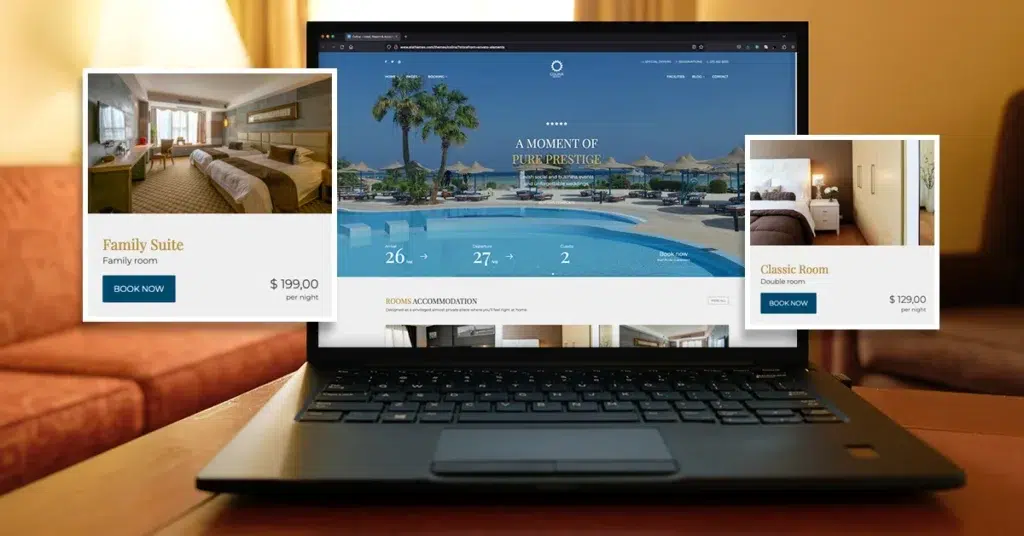
The home page is the main face of your lodging website and is essential for making a strong first impression. It should include a welcoming image, descriptive text about the hotel, and prominent calls to action (CTAs), ensuring that potential guests can quickly check room availability. Think of the home page as a tasting menu in a restaurant, showcasing a bit of everything that your website offers.
Clear Value Proposition
A hotel booking website design should effectively showcase unique selling points and engage visitors with captivating headlines. Highlighting all the features of the hotel, such as beachfront views or rooftop pools, can set it apart from competitors, while engaging headlines immediately grab attention and draw visitors into the content.
By emphasizing exclusive amenities and using catchy phrases, the website can resonate with potential guests, enhancing the overall design. A clear value proposition and bold statements about luxury or comfort can convince visitors to book a stay, ensuring they appreciate what makes the hotel special and encouraging them to explore further.
High-Quality Visuals
Elevate your hotel’s online presence with professional photography and video tours. High-resolution images of rooms and facilities create a lasting impression, making the hotel website design more appealing and allowing guests to visualize their stay. Investing in stunning visuals pays off in increased bookings, especially when combined with a simple hotel website template. High-quality visuals combined with a seamless booking experience can significantly enhance user engagement.
Meanwhile, video tours offer an immersive experience, enabling guests to explore the hotel virtually before booking. Dynamic visuals effectively showcase the ambiance and layout, enhancing the overall hotel website design. Visitors feel more confident in their decision to book after watching a well-produced tour, ultimately leading to more direct bookings.
Designing a Boutique Hotel Website
A boutique hotel website design should prioritize unique brand identity and visual appeal to attract potential guests. The website should include high-quality images and detailed descriptions of rooms, amenities, and services to give guests a sense of what to expect. A seamless online booking process is essential, allowing guests to easily book and pay for their stay.
The website should be optimized for search engines, including Google Maps, to improve the hotel’s online visibility and drive more direct bookings. Social media integration is also crucial, allowing guests to share their experiences and interact with the hotel. Ensuring the website is responsive, so it is easily accessible on all devices, including desktops, tablets, and mobile phones, is vital.
A boutique hotel website should also include a content management system (CMS) to easily update the website and manage online bookings. Security is paramount, so the website should feature SSL encryption and payment gateway integration to protect guest payment details and ensure a secure online booking process.
Simplifying Navigation for Hotel Website Design
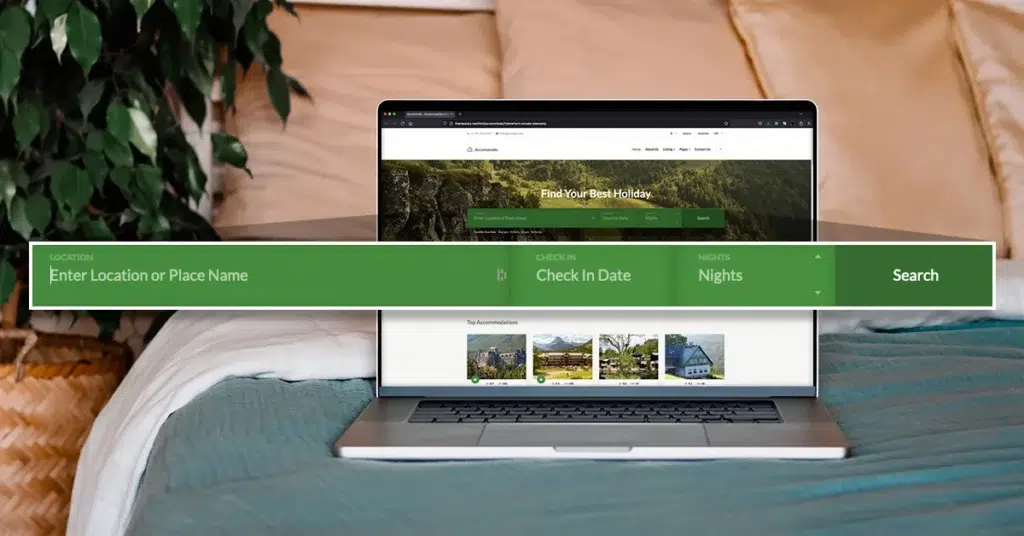
Intuitive Menu Structure
An organized menu is crucial for quick information access on hotel websites. By logically grouping similar items like “Rooms,” “Dining,” and “Amenities,” visitors can easily navigate the site, enhancing their overall experience. It’s essential to keep vital information, such as contact details and booking options, prominently displayed in the header or footer to ensure visibility.
This approach reduces user frustration and keeps visitors engaged. Additionally, integrating a booking engine is vital for enabling guests to make reservations directly online, which improves user experience and boosts direct bookings significantly. Integrating a property management system can further streamline operations, manage availability, and process payments efficiently, enhancing the user experience.
Search Functionality
A search bar is a crucial navigation tool for hotel websites, allowing users to quickly find specific content by typing queries. This feature enhances user satisfaction by saving time and effort. Implementing advanced search options, such as filters for room types, dates, and amenities, refines the user experience by narrowing down results, making information easy to locate. These enhancements not only make the website more user-friendly but also lead to higher conversion rates, as guests can efficiently find what they need without endless scrolling.
Optimising User Experience for Mobile

Creating a new website with a responsive design ensures a consistent user experience across all devices.
Responsive Design
Ensuring Compatibility Across Devices
A successful hotel website design must seamlessly function on all devices, ensuring a consistent user experience across smartphones, tablets, and desktops. Developers should employ responsive design techniques, utilizing flexible grids and layouts to adapt to different screen sizes. Media queries tailor the design for various devices, keeping guests engaged regardless of their device. Additionally, choosing a reliable web hosting provider is crucial for maintaining optimal performance and uptime for your hotel site.
Testing Mobile Usability
Testing mobile usability is essential for an engaging hotel website design. Developers should conduct thorough tests on multiple devices, as real-world testing reveals issues that simulators might miss. User feedback provides valuable insights into the mobile experience, and addressing these issues enhances overall usability. A well-tested mobile site leads to higher guest satisfaction.
Image Optimization
Optimizing images speeds up the hotel website design, as large image files can slow down loading times. Compressing images reduces file size without sacrificing quality, and using modern formats like WebP can further improve performance. Lazy loading defers off-screen images until needed, contributing to faster load times and keeping visitors on the site longer. Optimized images make the hotel website design more efficient.
Minimizing Code Bloat
Minimizing code bloat enhances the performance of a hotel website design. Excessive code slows down page loading, so developers should remove unnecessary scripts and styles. Minification reduces the size of HTML, CSS, and JavaScript files, while combining files decreases the number of server requests. Clean, efficient code improves site speed, offering a better user experience through a streamlined hotel website design.
Enhancing User Experience in Web
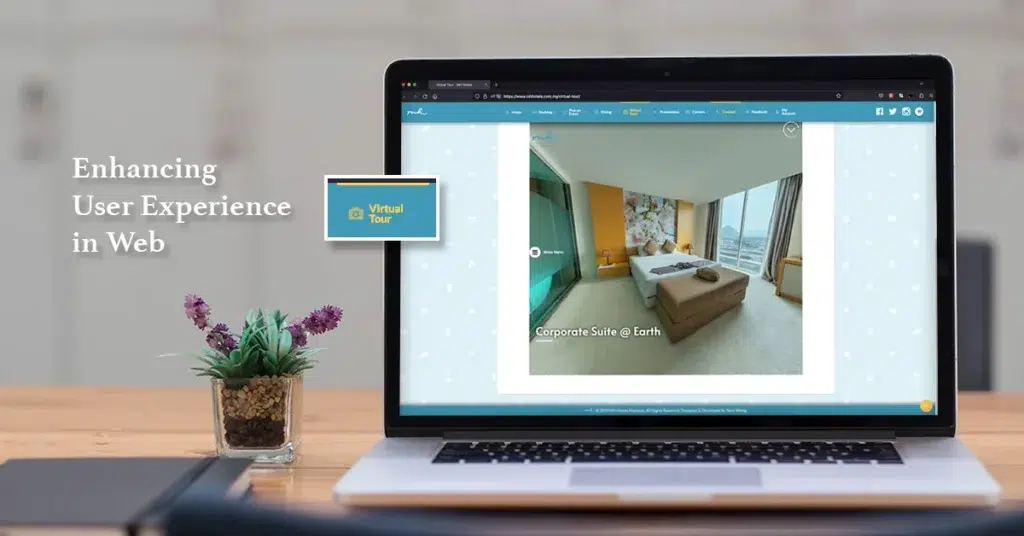
Photo by MH Hotels
Integrating a payment solution can streamline the booking process and enhance user satisfaction.
Interactive Elements User Experience
Booking widgets and virtual tours significantly enhance hotel website design by offering an interactive experience. Guests can check room availability and make online bookings directly on the page, streamlining the booking process and encouraging more bookings. Real-time updates ensure accurate information, enhancing convenience and guest satisfaction.
Additionally, virtual tours provide an immersive sneak peek into the hotel, showcasing high-quality videos of rooms, amenities, and surroundings. This dynamic feature creates excitement and anticipation, persuading visitors to book a stay by offering a comprehensive view of the property from the comfort of their homes.
Personalization
Dynamic content enhances your hotel website by personalizing the experience for each visitor. Returning guests are greeted with tailored messages, and special offers are displayed based on their browsing history, making the site feel unique to each user. This personalized approach boosts engagement and loyalty, creating a memorable user experience.
Additionally, personalized recommendations guide guests to relevant services and amenities, such as dining options, spa treatments, and local attractions. These suggestions align with user preferences and past behavior, enhancing the overall hotel website design. Guests appreciate the tailored suggestions, which boost satisfaction and encourage repeat visits.
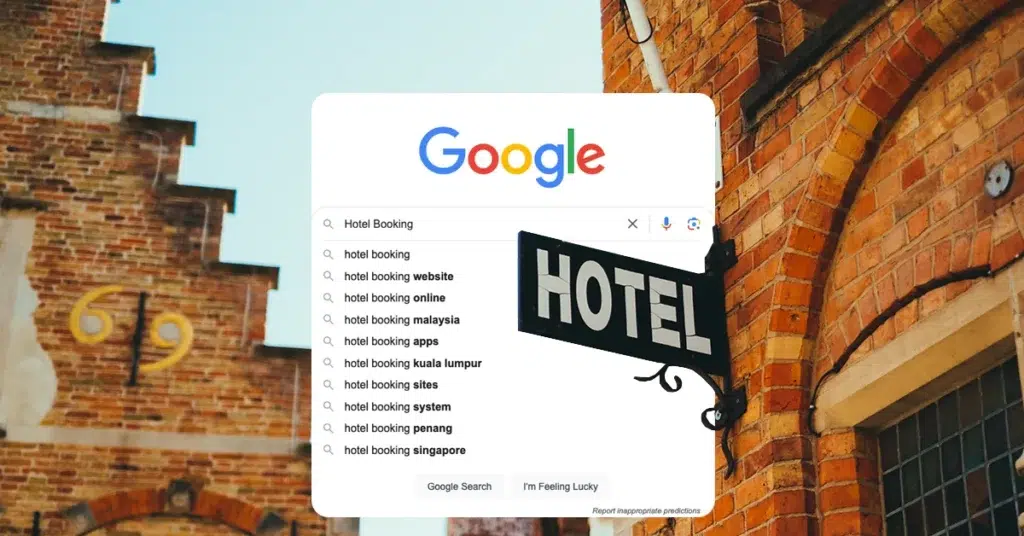
Optimizing your hotel website for search engines is crucial to attract more visitors and increase bookings. One of the best practices is to ensure that your website is mobile-friendly, as a significant portion of users access the internet via their smartphones. Additionally, using specialized website builders can help optimize the hotel website for search engines.
Keyword Research for Malaysia
Effective keyword research is vital for successful hotel websites, starting with understanding guest search behavior. Tools like Google Keyword Planner reveal popular search terms, focusing on phrases related to hotel amenities, location, and services. Employing long-tail keywords attracts more specific queries, increasing the chances of appearing in search results and driving targeted traffic to the website.
Incorporating keywords naturally enhances readability, placing them within headings, subheadings, and body text without keyword stuffing, which can harm search rankings. Search engines favor content that flows smoothly and engages readers, improving both user experience and SEO performance.
Meta tags and descriptions are crucial for SEO success. The title tag should include the primary keyword and reflect the page content, kept concise and compelling. The meta description provides a brief summary of the page, enticing users to click through while naturally including secondary keywords.
Internal linking enhances site navigation and SEO by linking related pages within the content to guide users, distributing page authority across the site. Descriptive anchor text for links helps search engines understand site structure, improving user engagement and search rankings. Internal linking enhances site navigation and SEO by linking related pages within the content to guide users, distributing page authority across the site.
Engaging Content for Hotel Industry
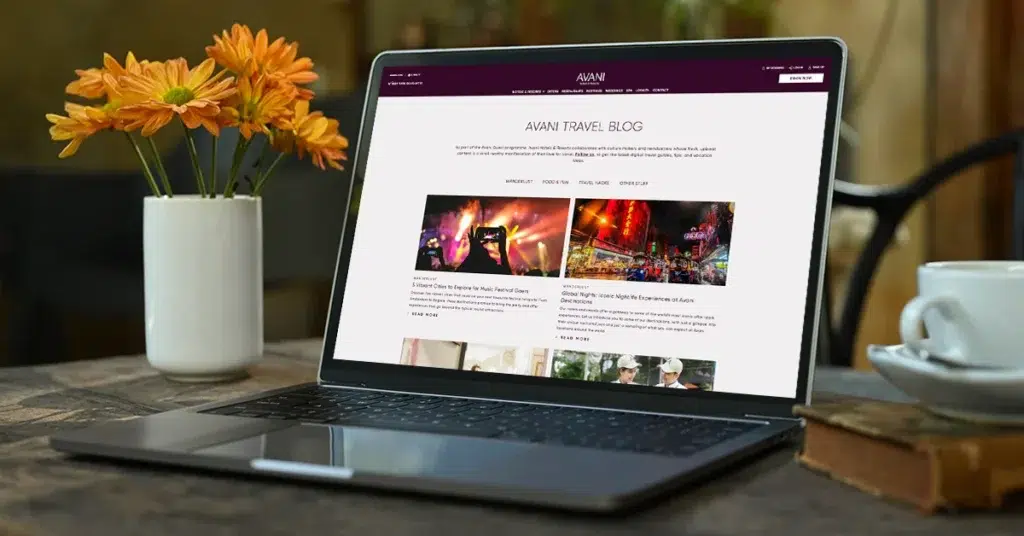
Photo by Avani Hotel
Engaging content is crucial for capturing the attention of potential guests and keeping them interested in your property. By providing valuable information, stunning visuals, and interactive elements, you can create a memorable experience that encourages visitors to book directly through your website. Engaging content can significantly enhance the hotel’s website and attract more visitors.
Blog and Articles
Writing informative posts can elevate a hotel website from ordinary to extraordinary by captivating readers with valuable insights, such as how to create a hotel website. Covering topics from local attractions to travel tips, engaging content encourages visitors to return.
Consistent updates ensure fresh information, establishing the hotel as an authority in the travel industry. Strategic keyword use enhances the visibility of blog posts, seamlessly blending keywords into content without overstuffing. Focusing on phrases related to the hotel’s unique features and location naturally improves search engine rankings, attracting more organic traffic to the hotel website design.
User-Generated Content
Guest reviews and testimonials are vital for a hotel website design, adding authenticity and building trust among potential visitors. Encouraging guests to share their experiences and highlighting positive feedback on the website showcases guest satisfaction, inviting interaction and engagement.
Testimonials serve as powerful endorsements, resonating with new visitors and providing social proof of the hotel’s quality. Including personal touches like photos or videos adds authenticity, enhancing the overall appeal of the hotel website design and fostering a sense of community and trust, ultimately driving more direct bookings.
Social Media Integration Tips

Photo by Berjaya Hotel
Having your own website allows for better integration with social media platforms.
Social Sharing Buttons
Strategically placing social sharing buttons can significantly boost a hotel’s online presence by encouraging guests to share captivating content like blog posts and photo galleries. These buttons should be visible yet not overwhelming, ensuring guests can easily find and use them.
Creativity is key in motivating guests to share; offering incentives like discounts for sharing posts or showcasing guest photos on social media can foster a sense of community. This engagement not only enhances the hotel’s online visibility but also strengthens guest relationships, ultimately driving more direct bookings and increasing overall engagement.
Social Media Feeds
Integrating social media feeds into a hotel website adds dynamic, real-time content that keeps the site fresh and engaging. Displaying live updates from platforms like Instagram and Twitter allows guests to see ongoing interactions and activities, enhancing the user experience.
Regularly updated feeds provide a sense of activity and vibrancy, while showcasing user interactions such as guest comments and reviews builds trust and credibility. Highlighting user-generated content prominently humanizes the hotel brand and fosters a sense of connection and reliability, ultimately encouraging more direct bookings.
Clear Call to Actions (CTAs)
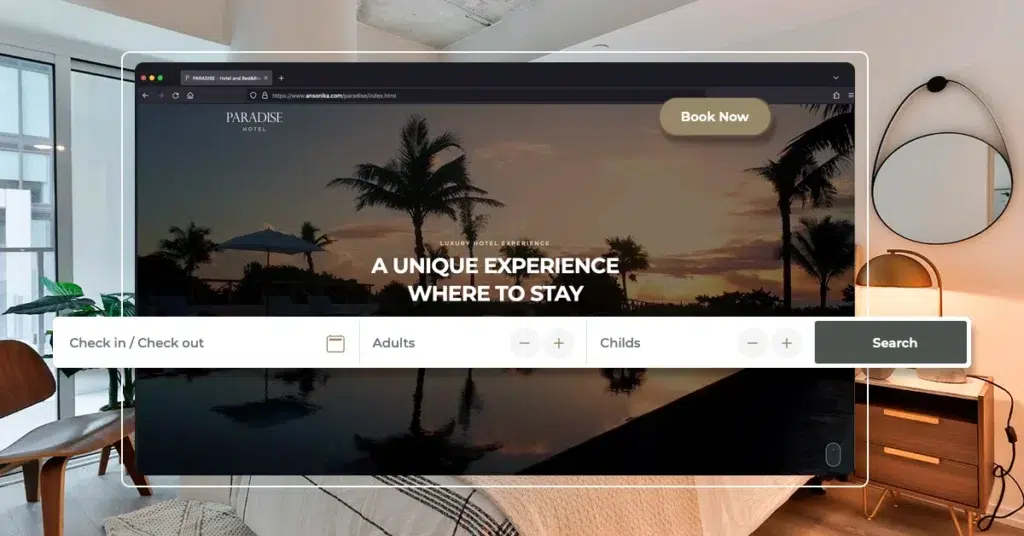
A clear call to action (CTA) is essential for converting website visitors into customers. Whether it’s booking a room, signing up for a newsletter, or contacting the hotel, a well-designed CTA can significantly impact your conversion rates. Using action-oriented language, contrasting colors, and strategic placement can make your CTAs more effective. Additionally, a website creator can help design effective CTAs that drive conversions.
Strategic Placement in Hotel Website Design
For an effective hotel website design, strategically placing CTAs is crucial. Positioning them above the fold ensures immediate visibility, capturing visitor attention right away and encouraging quick actions like booking rooms or exploring amenities. Additionally, sprinkling CTAs throughout the page maximizes their impact, guiding visitors toward specific actions such as booking, contacting, or learning more. This approach enhances user engagement, providing clear directions and facilitating easy navigation, ultimately improving the overall user experience and boosting conversion rates.
Compelling Language
Craft CTAs with compelling action words like “Book Now” or “Explore Rooms” to prompt immediate responses, creating a sense of urgency that turns a hotel website into a conversion powerhouse. Guests are driven to act quickly when CTAs convey urgency with phrases like “Limited Time Offer” or “Only a Few Rooms Left,” enhancing engagement and encouraging bookings by conveying scarcity.
Trust and Credibility to Inspire Your Website Design
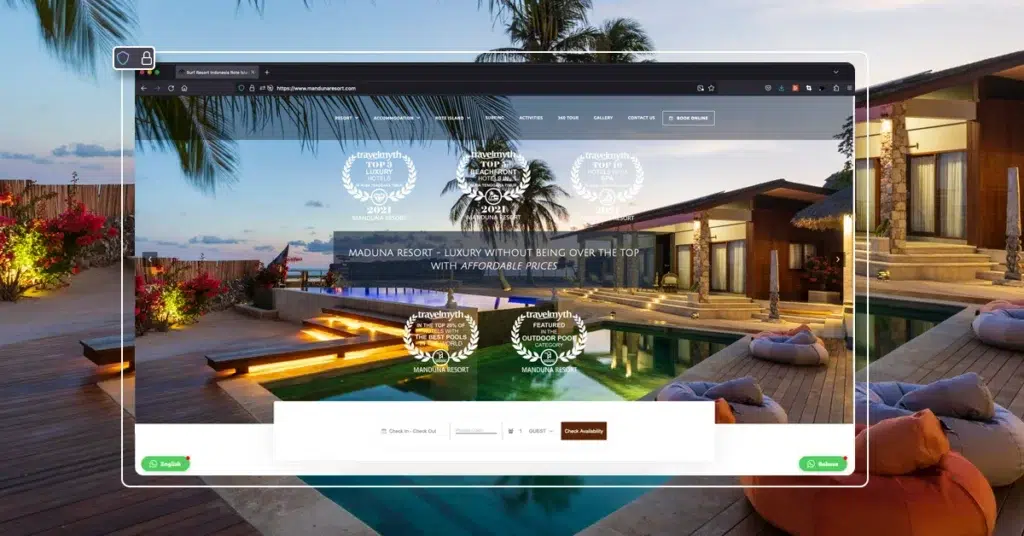
Photo by Maduna Resort
A professional website can inspire trust and credibility among your guests. Websites created with strong security features, such as SSL encryption and DDoS protection, can further build trust and credibility among guests.
Security Badges
SSL certificates and trust seals are essential for establishing trust and credibility on hotel websites. Displaying SSL certificates, which show a padlock icon in the browser’s address bar, reassures visitors about data security by encrypting their personal information, thereby protecting it from cyber threats. Prominently showcasing these certificates builds confidence among guests.
Similarly, trust seals from third-party organizations, like Norton Secured and McAfee Secure, further enhance credibility by indicating that the website meets high-security standards. Featuring these badges on key pages, such as booking and payment sections, boosts guest confidence and encourages bookings by signaling that the site is secure and trustworthy.
Customer Reviews
Positive feedback serves as powerful social proof, swaying potential guests by showcasing glowing reviews and testimonials from satisfied customers. Displaying these insights prominently on the homepage builds trust and highlights the hotel’s strengths. Personal touches, like photos of reviewers, add authenticity.
Responding to both positive and negative reviews demonstrates a commitment to guest satisfaction, with personalized responses showing attentiveness and transparency. Engaging with reviews not only enhances the hotel’s reputation but also fosters a sense of community and trust among guests.
Integration with Desk and Online Booking Engine
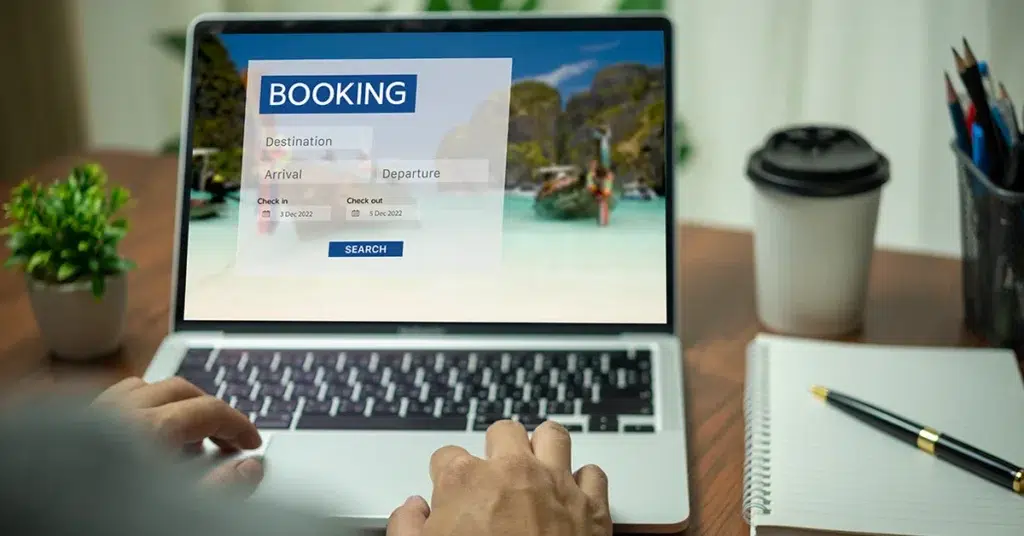
Integrating a booking engine with your hotel website is crucial for managing direct bookings efficiently. It allows guests to book rooms directly from your website, reducing the need for third-party booking platforms and increasing your revenue. Additionally, using a hotel website builder with no lock-in contracts offers flexibility and control over your online presence.
Seamless Booking Process
A seamless booking process is crucial for an effective hotel website design, and a robust hotel website builder can provide the necessary tools to achieve this. Simplifying reservation steps enhances user experience, as guests appreciate a straightforward path to booking their stay. Each step should be intuitive, necessary, and free of redundancies to reduce abandonment rates.
Providing clear instructions is essential for a smooth booking experience, with concise directions, easy-to-understand labels, and visual cues like progress bars to guide users. This transparency minimizes confusion and frustration, instilling confidence in guests as they complete their reservations.
Payment Options
Incorporating multiple payment methods into a hotel website design enhances flexibility and caters to a diverse audience. By offering options such as credit cards, debit cards, and digital wallets, guests can choose their preferred payment method, which can lead to increased bookings. Equally important is ensuring secure transactions to build trust and credibility.
Implementing encryption technologies safeguards sensitive details during the payment process, while displaying security badges reassures visitors about data protection. A secure and versatile payment system not only enhances the overall hotel website design but also makes guests feel more comfortable making reservations, knowing their information is protected.
Driving Direct Bookings
Driving direct bookings is crucial for hotels to reduce reliance on online travel agencies (OTAs) and increase revenue. A hotel website with a seamless online booking process and competitive pricing can help drive more direct bookings. Utilizing search engine optimization (SEO) techniques can improve the hotel’s online visibility and drive more direct bookings.
A good hotel website design should include a prominent call-to-action (CTA) to encourage guests to book directly. Offering loyalty programs, discounts, and other incentives can also encourage guests to book directly. A user-friendly interface and easy navigation can help reduce bounce rates and increase direct bookings.
Hotels can also use social media and email marketing to promote their website and drive more direct bookings. By providing a secure and seamless online booking process, hotels can increase customer trust and drive more direct bookings, ultimately increasing revenue and reducing reliance on OTAs.
Analytics and Tracking
Using analytics tools to track and analyze your hotel’s performance is crucial for understanding your guests’ behavior and preferences. These tools provide valuable insights that can help you make informed decisions to improve your services and increase bookings. Additionally, using these analytics tools does not require extensive technical skills, making it accessible for hotel owners.
Setting Up Google Analytics
Google Analytics is a powerful tool for transforming a hotel website into a data-rich platform. By monitoring key metrics such as pageviews, bounce rates, average session duration, and conversion rates, hoteliers can gain valuable insights into user interactions and website performance.
Analysing user behaviour through heatmaps, session recordings, and path analysis helps identify navigation patterns and areas needing improvement. These data-driven insights guide design enhancements, ultimately leading to an improved user experience and increased bookings.
Conversion Rate Optimization
A/B testing transforms website optimization from guesswork into a scientific approach by comparing two versions of a webpage to see which performs better in terms of metrics like click-through rates and conversions. This method allows for small changes, such as button colors or headlines, to have significant impacts on user engagement.
Analyzing A/B test results involves identifying statistically significant differences and focusing on metrics that align with business goals. Positive outcomes are implemented site-wide, while negative or neutral results lead to further experimentation. Regular analysis ensures the website continually evolves to meet user preferences, maximizing its effectiveness.
Regular Website Updates and Maintenance

Content Updates
Keeping a hotel website up-to-date is crucial for guest satisfaction and planning. Regularly reviewing and refreshing content ensures accuracy and relevance, reflecting a commitment to excellence. Additionally, highlighting seasonal promotions, such as holiday and event-specific deals, can attract more guests during peak times. Featuring these exclusive offers prominently on the homepage not only boosts bookings but also enhances the overall appeal and engagement of the hotel’s online presence.
Technical Maintenance
Regular backups and security updates are essential for maintaining a secure and reliable hotel website. Backups protect valuable data, ensuring quick recovery from unexpected issues, while storing them in secure locations adds an extra layer of protection. Automated systems simplify this process. Concurrently, updating security measures and installing the latest patches safeguard against cyber threats, preventing breaches and protecting guest information. These practices not only maintain the website’s integrity but also foster trust and credibility, making guests feel confident in the security of their data.
Final Thoughts
An engaging hotel website holds immense importance in today’s digital age. Implementing the provided tips can transform a basic site into a booking powerhouse. Staying updated with trends and user needs ensures continued success. Embrace these strategies to elevate the online presence and boost guest satisfaction.





